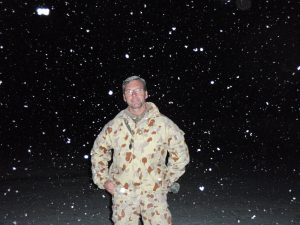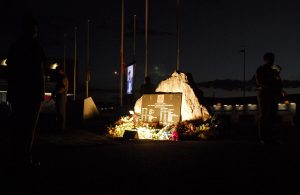Moral Injury, Spiritual Wounds and Dents in the Soul; if Jesus is the answer what is the Church’s role in healing?
This was written and first published on this website in 2017. As the ADF deal with the aftermath of deployment for fires, floods, overseas operations, COVID and now the Brereton Inquiry, the following words from Chaplain Rob still ring true.
If you are finding life hard to deal with at present, or would like someone to talk to, please seek out your local ADF Chaplain, Pastor or call Open Arms 1800 011 046 (24HR) or Lifeline for those not currently serving 13 11 14 (24HR)
Chaplain Rob Sutherland
 I thoroughly enjoyed my time as an infantry officer. I served in the ‘long peace’, joining the Army after the Vietnam War and transferring to the Chaplains Department just before everybody went to East Timor. As an infantryman, I didn’t deploy; however, as an Army Reserve Chaplain I deployed twice to Bougainville with the peace monitoring group, and as a Regular Army Chaplain I’ve had five overseas operational deployments including Timor Leste and Afghanistan.
I thoroughly enjoyed my time as an infantry officer. I served in the ‘long peace’, joining the Army after the Vietnam War and transferring to the Chaplains Department just before everybody went to East Timor. As an infantryman, I didn’t deploy; however, as an Army Reserve Chaplain I deployed twice to Bougainville with the peace monitoring group, and as a Regular Army Chaplain I’ve had five overseas operational deployments including Timor Leste and Afghanistan.
I hope that you are as proud as I am of the young men and women that we’ve sent away to war on our behalf. They are fine Australians, well selected, trained, and equipped, and they’ve done great things; but the reason I’m so proud is the way they’ve done it. I’ve seen their compassion and concern for the people of Bougainville, Afghanistan and Timor Leste. I’ve seen their calm, restraint, mercy and their love. We don’t go to these places to make them into Australia. We go to help people to have the freedom to be who they decide to be.
In my view the Australian Defence Force (ADF) cares well for the physical health of sailors, soldiers, airmen and women. The battlefield survival rates for Australians are among the best in the world. From a mental health perspective, I don’t see any one in the world doing much better than we are. The estimate is that about 20% of our veterans will suffer some form of mental health disorder at some stage of their lives. Post Traumatic Stress Disorder (PTSD) is the most common condition, with about 8% reportedly suffering from PTSD in any single year.
Some suggest that everyone has PTSD to some degree. PTSD is a problem; I can personally describe its debilitating effects. Those of us with PTSD do road rage really well and we’re terrible to live with, but PTSD is just one of the many mental problems that we can come home with and perhaps it isn’t the worst. Adjustment disorder, depression, sexual dysfunction, sleep loss, anger and various fears and phobias are not nearly as well recognised. ADF screening of people on return from operations and psychological help afterwards are pretty good. The ADF mental health support is good and has been improving for the last decade and a half. We have pretty good treatments for PTSD. However these figures can’t account for all the behavioural issues that we are seeing in our veterans.
If only about 20% have a diagnosable mental health condition, this doesn’t account for the behavioural issues we are seeing in many more people: unwarranted, inappropriate behaviour in far more than are suffering from PTSD. PTSD is diagnosable and treatable but I don’t think it is the biggest danger. It’s embarrassing and painful, and often not fun to live with. People with PTSD may drink and fight too much, over react in apparently innocuous situations, and even suicide; but I don’t see anything in PTSD in itself that is the likely cause of most suicide.
Fundamentally PTSD is an overdone fear response. Little things remind us to be overly afraid. In my view guilt, shame, feeling worthless, unlovable, unable to love, feeling betrayed, abandoned and unable to trust anyone or anything, and seeing no hope in the world or in things that you believed in; these are much more likely reasons for suicidal behaviour. I see these and depression as the biggest health issues facing our servicemen and women, and our veterans.
 Recent psych research with US marines who are suffering a combat or operational stress reaction, determined that only about 10% had PTSD as their primary issue. 40% had a newly described condition that the researchers named Moral Injury. If the ADF rate of PTSD in any given year is about 8-12%, then I would expect Moral Injury to be about 40%. No ADF research has been completed into Moral Injury, although I believe there’s some underway.
Recent psych research with US marines who are suffering a combat or operational stress reaction, determined that only about 10% had PTSD as their primary issue. 40% had a newly described condition that the researchers named Moral Injury. If the ADF rate of PTSD in any given year is about 8-12%, then I would expect Moral Injury to be about 40%. No ADF research has been completed into Moral Injury, although I believe there’s some underway.
It has been said that everyone comes home from operations with dents in the soul. This doesn’t mean everybody is incapacitated by these dents, but everyone is affected by what they’ve seen and done, or by what’s been done to them. Most soldiers recover quite naturally and well; but for some, the guilt, shame, betrayal and shattered worldview destroy their lives and families, and can lead to suicide.
This concept of Moral Injury has drawn attention to the place of spiritual belief in our lives, what we see and do, and what is done to us. While the definitions are not yet agreed – particularly in Australia – this new category is helpful. My definition of moral injury is: the injury that occurs to our spirit or souls when we see or do, or can’t or don’t stop, or have done to us, things which are contrary to what we believe is right and good. The fact that Australian servicemen and women are suffering moral injury could be seen as positive because it says we believe in good things; however, the results of this injury can be devastating – shattering our faith in what we believe, hope in a good future, love of God and families and ourselves, trust in God and others and ourselves, understanding of what’s right and wrong, and self worth and righteousness.
I’m intensely proud of our Australian servicemen and women. I have spent well over a year deployed with them. I’m proud of the restraint shown by our young men and women, when they’ve decided not to fire, how they adhere to their rules of engagement even when under great pressure. Yet most of our Service men and women come home feeling guilty. Some feel guilty for coming home when their mates didn’t. Some report feeling guilty for coming home or being made to come home when the job isn’t finished.
One group who find it hardest are our engineer search operators. They move ahead of a convoy in search of improvised explosive devices (IEDs). They are brave and dedicated, always under pressure, and they feel responsible for protecting their mates; but it’s just not possible to find everything. The Taliban are good at what they do and know the land better than we ever can. The engineers are under pressure by convoy commanders to clear faster – faster than they would like to. Their commanders know that if the convoy moves too slowly they’ll get ambushed, even more IEDs will be laid in their way, or perhaps the intended target of the patrol will just escape. Speed is important but speed is the enemy of search. When an IED is missed, the engineers can feel guilty, can feel they have failed to protect their mates. We might say that they have no reason to feel guilty; but they also feel betrayed at the same time by their own commanders even when those commanders are also doing the right thing.
Coming home, some feel guilty for not fixing Afghanistan. Some feel guilty having experienced abject misery, poverty, and suffering; and coming home to our own wealthy homes and families. The wounded can also feel betrayed. Despite the best medical care in the world our wounded often end up feeling betrayed and abandoned.
These spiritual wounds are seen in behaviours. This is how we, from the outside, can identify those with spiritual wounds. We see suicidal behaviour, self-harm, risk taking behaviour, anger, broken relationships, hopelessness, giving up on life, people isolating or withdrawing, or substance abuse. Those suffering or experiencing these wounds experience them on the inside as feelings. Sufferers can feel guilty or ashamed, grief, loss, they feel angry, betrayed, abandoned, forsaken, unlovable, or unable to love even those who are closest to them and whose love has sustained them on the deployment. They can feel hopeless; that life is pointless.
I work with a parish based church group called Warrior Welcome Home. The title is deliberately chosen, because this is what we want to do. We want to get our wounded warriors, recognise them as warriors, and welcome them home. We believe that spiritual wounds can all be healed. We bring a Christian response to the situation. The love of God can break through to those suffering spiritual wounds (see Mark 2:3-12). We believe that the Jesus of the gospel brings meaning and healing.
R emember Jesus’ cry upon the cross – ‘My God, My God why have you forsaken me?’. Jesus, the only innocent to have ever lived, the only one to have loved God the Father perfectly, was hung on a Roman cross. Betrayed by one of his own followers, but also by the religious leaders and his own people. He was abandoned by his closest friends who even denied that they ever knew him. He was betrayed by the judicial and ruling authorities, and he even felt that God had forsaken him. When I introduce soldiers to this reality of Jesus death, they can start to believe that Jesus can understand how they feel.
emember Jesus’ cry upon the cross – ‘My God, My God why have you forsaken me?’. Jesus, the only innocent to have ever lived, the only one to have loved God the Father perfectly, was hung on a Roman cross. Betrayed by one of his own followers, but also by the religious leaders and his own people. He was abandoned by his closest friends who even denied that they ever knew him. He was betrayed by the judicial and ruling authorities, and he even felt that God had forsaken him. When I introduce soldiers to this reality of Jesus death, they can start to believe that Jesus can understand how they feel.
Indeed, God did not send the Son into the world to condemn the world, but in order that the world might be saved through him. John 3:17 (NRSV)
I believe spiritual health is a life-giving relationship with the living God through the body of Christ. At times the body of Christ on earth, the church, has proved to be a weak link. Some churches have treated soldiers, wives and families very hurtfully. Military families can feel unwelcome in churches. Some wives have been made to feel by churches that their husband’s issues are their fault. One wife described it like this, ‘I was at church and this woman came up to me and said if you just had more faith your husband would get better.’ How can PTSD be a wife’s fault?
As a part of Warrior Welcome Home, we take service people and often their partners and to a beautiful part of the world. Our parish runs our retreat on Sydney harbour and we feed them wonderful coffee and great food and maybe some red wine. We take them on some fun activities and we try to spoil them, to love them. At the end of our retreat we have a simple dinner with about 100 people from our parish and community who just say ‘thank you’. This has had a profound effect. One veteran responded in tears after the dinner “that was amazing!…I’ve just had the kids from that table say thank you for what you did and thank you for your service…. my own children have never thanked me for what I’ve done. For the first time I feel thanked and valued.”
I believe that God can heal and God can give life. I believe that this is the reason Jesus came into the world and lived and died. Warrior Welcome Home gives space and we listen. We believe that God’s Word is light to the world, shining into every darkness, and no darkness will ever overcome this light. Even the darkness that our servicemen and women and their families feel, God can overcome. We have seen that the Spirit of God can and does heal in this world. We help veterans and their families to share their stories, their pain, their hurts, and let God make meaning of what has happened. We’ve found that the simple love of God breaks through into the souls of soldiers and their families. We’ve found that if we can bring our wounded friends to Jesus, he can and does heal them. God’s love – in this case the love of people from a normal parish church – love works.
 others in the ADF and the wider Christian community. Please consider how you can support us through prayer, finances and getting involved in the MCF community.
others in the ADF and the wider Christian community. Please consider how you can support us through prayer, finances and getting involved in the MCF community.